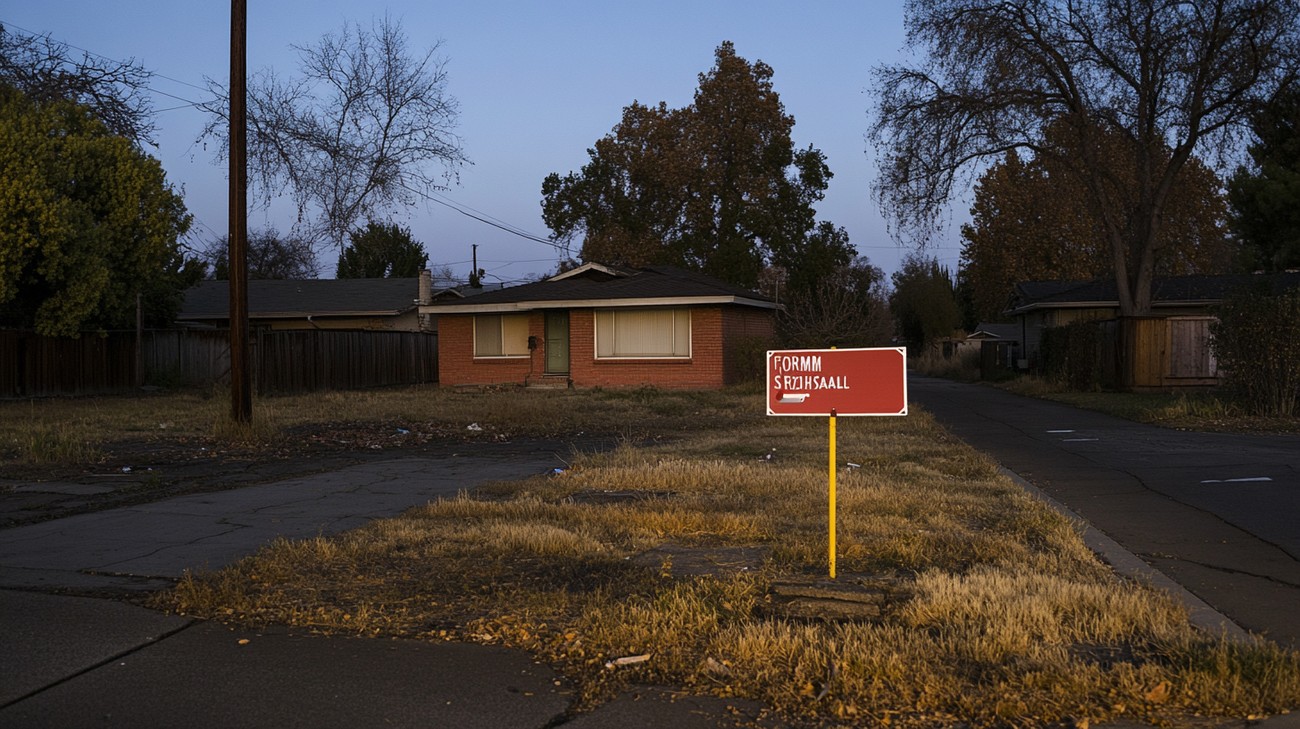Give Us A Call Today
(916) 237-9457Short Sale vs. Foreclosure: Key Differences Explained
Brandon Evans on March 21, 2025When faced with financial hardship, homeowners often find themselves weighing options to manage mortgage debts that they can no longer afford. Two common solutions that might come to mind are short sales and foreclosures. Both paths offer ways to address a difficult situation, but they have significantly different impacts on the homeowner, the lender, and the future of the owner's creditworthiness. Explore the differences, processes, and consequences of short sales versus foreclosures to make an informed decision based on your circumstances.
What is a Short Sale?
A short sale occurs when a homeowner sells their property for less than the amount owed on their mortgage with the lender’s approval. Homeowners might consider a short sale when they can no longer keep up with their mortgage payments, and the market value of their home has declined below what they still owe.
Key Characteristics of a Short Sale:
- Requires lender approval.
- Typically initiated by the homeowner.
- Potential to negotiate the terms with the lender.
- Less damaging to the homeowner’s credit score compared to a foreclosure.
- The homeowner generally avoids eviction and retains more control over the sale process.
What is a Foreclosure?
On the other hand, foreclosure is a legal process initiated by the lender to reclaim the property after the homeowner fails to make mortgage payments. Foreclosures usually happen after the homeowner has defaulted on the mortgage and can no longer meet the terms agreed upon with their lender.
Key Characteristics of a Foreclosure:
- Typically initiated by the lender after mortgage default.
- Involves legal intervention to repossess the home.
- More severe negative impact on the homeowner’s credit report.
- Homeowner may be evicted if they haven't vacated the property.
- The process can be lengthy and emotionally stressful for the homeowner.
Short Sale vs. Foreclosure: A Detailed Comparison
Credit Implications
Short Sale:
- Generally, a short sale will harm a credit score but not as drastically as a foreclosure.
- The consumer’s credit report may reflect the terms ‘paid in full for less than agreed’ or similar verbiage.
- Recovery from a short sale's credit impact might take approximately 2 to 4 years.
Foreclosure:
- Leads to a significant drop in the homeowner’s credit score.
- Recorded on the person’s credit report for up to seven years.
- Complicates the possibilities of obtaining future loans or credit cards.
Emotional and Financial Toll
Short Sale:
- Provides a sense of control as homeowners actively participate in the sales process.
- Might result in better emotional outcomes due to less public scrutiny.
- Helps negotiate debts and potentially minimize financial obligations related to the deficit.
Foreclosure:
- Typically results in higher stress due to legal proceedings.
- Involves evictions and public notices, leading to potential social and personal embarrassment.
- Leaves the homeowner with fewer options to manage the remaining debt.
Duration and Complexity
Short Sale:
- Depends on finding a buyer and negotiating with the lender, which can vary from a few months to a year.
- Involves paperwork and approval delays but is generally more streamlined than foreclosure.
Foreclosure:
- Can be a prolonged process, lasting from several months to even years.
- Involves significant legal and bureaucratic hurdles.
Future Housing Concerns
Short Sale:
- Homeowners may be eligible to purchase another home sooner compared to a foreclosure scenario.
- Potential lenders view short sales more favorably, although some restrictions may apply.
Foreclosure:
- Purchasing another home might need to be postponed until the foreclosure is cleared from credit history.
- Future loans may carry higher interest rates and require larger down payments.

Frequently Asked Questions
How does a foreclosure differ from a short sale?
Foreclosure is a legal process initiated by the lender when the homeowner fails to make mortgage payments. In a foreclosure, the lender takes control of the property after the homeowner is unable to meet the obligation of the mortgage agreement. By contrast, a short sale requires the homeowner’s active participation to sell the home before it goes into foreclosure, typically at a price less than the mortgage balance.
What are the financial implications of a short sale?
A short sale can still negatively impact a person's credit score, but it's generally considered less damaging than a foreclosure. Homeowners who undergo a short sale might face a deficiency judgment if the sale does not cover the full mortgage balance, although this can sometimes be negotiated with the lender to be forgiven.
Is foreclosure always the last resort after a short sale?
Foreclosure is often regarded as the last resort, typically pursued only when other loss mitigation options (like a short sale) have failed or are deemed inappropriate by the lender. Foreclosure can be more costly and time-consuming for a lender than a short sale and carries greater reputational and financial risks for the homeowner.
Can a homeowner pursue a short sale without the lender’s approval?
No, the lender’s approval is essential for a short sale because they agree to accept less than the amount owed on the mortgage. The homeowner needs to submit a short sale proposal or request that includes evidence of financial hardship and a market analysis supporting the proposed sale price.
What impact does a foreclosure have on a homeowner's future ability to purchase a home?
A foreclosure significantly impacts a person's credit report and can drastically decrease their credit score. It may deter lenders from approving future mortgage applications for a significant period, typically no less than seven years. In contrast, a homeowner who has gone through a short sale might face a shorter waiting period, depending on the lender's policies.
How long do short sales and foreclosures typically take?
The duration of a short sale can vary significantly but usually takes from a few months to over a year to complete, depending on the complexity of the sale and the lender's efficiency in processing the sale. Foreclosures can also take a considerable time, generally longer than a short sale, depending on the judicial requirements and the backlog of the court handling the foreclosure.
What are the effects of both a short sale and a foreclosure on the homeowner’s credit score?
Both a short sale and a foreclosure can negatively impact a homeowner's credit score but to different extents. A foreclosure often results in a greater reduction in score and longer-lasting negative marks on credit reports. A short sale, while also damaging, is less severe and may be viewed more favorably by future lenders.
Are there specific circumstances where a lender would prefer a short sale over a foreclosure?
Lenders might prefer a short sale when they believe that the financial recovery from a short sale exceeds what would be recovered through a foreclosure after considering legal costs, maintenance costs, and potential depreciation of property value. Lenders are typically motivated to recover as much debt as possible in the shortest time frame.
What legal considerations should homeowners be aware of when deciding between a short sale and a foreclosure?
Homeowners should consider the implications of deficiency judgments and tax consequences. In some jurisdictions, lenders can pursue a deficiency judgment against the homeowner for the difference between the sale price and the mortgage amount in both short sales and foreclosures unless specifically waived. Additionally, any forgiven debt can be taxed as income, although there are periodic exemptions and waivers under federal law.
How does a homeowner begin the process of a short sale?
To begin a short sale, a homeowner typically needs to contact their mortgage servicer to discuss financial hardship details. They have to submit a financial package including proof of income and hardship, a letter describing their circumstances, and a comparative market analysis or brokerage offer showing the home's current potential sale price.
What can homeowners do to mitigate the negative effects of foreclosures?
Homeowners facing potential foreclosure should engage with their lenders early to explore options such as loan modifications, forbearance agreements, or a short sale. Obtaining professional advice from a real estate attorney or a financial advisor can also help to navigate the complexities and develop a strategy that minimizes the financial and legal repercussions.
Understanding the nuances and implications of both short sales and foreclosures can provide homeowners with better insights into their options when facing financial difficulties with their mortgage.

Pros & Cons
Short Sale vs. Foreclosure: What Sets Them Apart
Pros of a Short Sale
1. Less Damaging to Credit Score
- Details: A short sale generally impacts a homeowner’s credit score less severely than a foreclosure. While both negatively affect credit scores, a foreclosure can drop a score by 200 to 400 points, while a short sale might reduce it by about 100 to 150 points.
- Long-Term Benefit: This relatively smaller reduction can make recovery quicker, typically allowing borrowers to qualify for another mortgage within two years compared to the seven-year period post-foreclosure.
2. More Control Over the Sale
- Details: In a short sale, the homeowner retains more control over the sale of their home. They can choose the buyer and negotiate the terms directly with them, potentially agreeing on a better sale price and minimizing the deficiency (the remaining amount owed after the sale).
- Emotional Aspect: This process can be less stressful and more dignified than a foreclosure, as the homeowners participate actively in the sale and moving process without the sudden disruption of an eviction.
3. Potential Debt Forgiveness
- Details: Lenders might choose to forgive the remaining debt in a short sale if the homeowner negotiates effectively. This is not guaranteed but is possible, depending on the agreement with the lender.
- Financial Relief: If the debt is forgiven, this can relieve the former homeowner of significant financial burdens, allowing them to rebuild their financial stability more quickly.
4. Avoid Legal Fees
- Details: When opting for a short sale, homeowners can generally avoid the hefty legal fees associated with the foreclosure process.
- Cost Savings: Avoiding these costs can be beneficial, particularly when finances are already strained, helping conserve resources for future housing and other necessities.
Cons of a Short Sale
1. Complicated Process
- Details: The process of a short sale can be lengthy and complicated, often requiring the approval of multiple lien holders. This can be a time-consuming and frustrating process that sometimes takes longer to finalize than a foreclosure.
- Uncertainty: There’s also no guarantee that the creditor will accept a short sale offer, which could stretch the period of uncertainty and stress for the homeowner.
2. Possible Deficiency Judgments
- Details: If the selling price agreed upon doesn’t cover the mortgage balance, the lender might not forgive the remaining debt, leading to a deficiency judgment against the homeowner.
- Financial Burden: This could mean the debtor remains responsible for paying back the difference, potentially leading to additional financial obligations post-sale.
3. Impact on Credit Availability
- Details: Despite being less harmful than a foreclosure, a short sale still negatively impacts one's credit report and can hinder the ability to obtain loans or credit lines for some years.
- Restriction on Financial Flexibility: This reduced credit availability can affect purchasing power and limit financial growth opportunities.
4. Tax Implications
- Details: If the lender forgives the remaining debt, this forgiven debt may be considered taxable income, except under certain conditions covered by tax provisions.
- Surprise Costs: Homeowners might need to pay income tax on the amount of debt forgiven, which can be a significant financial burden if not planned for.
Pros of Foreclosure
1. Elimination of Underwater Mortgages
- Details: Foreclosure can free a borrower from an underwater mortgage where the home value is less than the debt owed.
- Relief from Debt: This can provide a clean slate in terms of housing debt, although with significant credit and reputational consequences.
2. Clear Timeline
- Details: The process of foreclosure, while distressing, typically has a more predictable timeline than a short sale. Once foreclosure proceedings start, the homeowner can anticipate a relatively set schedule of events.
- Planning: This allows for better planning for relocation and financial adjustments, despite the challenges involved.
Cons of Foreclosure
1. Severe Credit Impact
- Details: Foreclosure severely damages a person's credit score and report, more so than a short sale. This impact can hinder financial dealings for years.
- Long-Term Consequences: The adverse effect on credit can prevent purchasing another home, obtaining credit cards, or even securing employment in some sectors for up to seven years or more.
2. Loss of Control and Dignity
- Details: Being evicted and losing one's home in a foreclosure is often perceived as humiliating and can be emotionally devastating.
- Psychological Impact: The experience can lead to significant mental stress and a sense of loss of autonomy over one's financial decisions.
3. Potential for Deficiency Judgments
- Details: Similar to short sales, foreclosures can also result in deficiency judgments where the sale of the foreclosed property doesn’t cover the full amount of the mortgage.
- Continued Debt: Homeowners could still be responsible for the remaining debt, extending financial difficulties even after losing their home.
4. Legal and Additional Fees
- Details: The foreclosure process incurs legal and other fees, which can add to the financial strain.
- Increased Debts: These fees, combined with the potential ongoing obligations from deficiency judgments, can exacerbate financial woes.

Summary
Understanding the Differences
Short sales and foreclosures are both options for homeowners struggling with their mortgage payments, but there are crucial differences between the two. A short sale occurs when a homeowner sells their property for less than the outstanding mortgage amount with the lender's approval. This option is generally less detrimental to the homeowner's credit score compared to a foreclosure and can offer a quicker recovery period for financial health. Conversely, a foreclosure is initiated by the lender when the homeowner fails to make payments; it involves the legal seizure of the property to recover the unpaid loan balance. This process not only damages credit scores more severely but also leads to a longer wait before the individual can purchase another home.
Financial and Emotional Impacts
When considering the financial consequences, short sales tend to provide a softer landing. They potentially allow homeowners to negotiate the terms with their lender, possibly influencing how the debt shortfall is handled after the sale. On the other hand, foreclosures usually result in the homeowner losing all control over the sale process, with the potential for a deficiency judgment, demanding payment of any loan balances owed post-property sale. The emotional toll is also less in short sales, as homeowners maintain some control over the process and timetable, potentially reducing the stress associated with losing a home. On the contrary, the abrupt and often involuntary nature of foreclosures can lead to significant emotional distress.
Future Housing Considerations
From a future housing perspective, short sales and foreclosures can affect a person's ability to buy a new home differently. Typically, those who go through a short sale can qualify for a new mortgage sooner than those who have been foreclosed upon. Lenders may view a short sale more favorably, regarding it as a proactive approach by the individuals to handle their financial difficulties. In contrast, a foreclosure is often seen as a last resort, which could signal to future lenders that the borrower poses a higher risk. This perception can make securing future loans more challenging and possibly subject the individual to higher interest rates or stricter loan conditions. Understanding these distinctions can help homeowners make informed decisions during financial hardships.
Get Your Fair Cash Offer: Start Below!
We buy houses in any condition -- no commissions or fees and no obligation whatsoever. Start below by giving us a bit of information about your property or call 916-237-9457.
Sacramento, CA 95825
Why Us
- No appraisal or home inspection.
- No repairs needed, as-is sale.
- No fees, taxes, or commissions
- Just one walkthrough.
- Close date of YOUR choice.
© 2025 Sell Your Home For Cash Sacramento. All Rights Reserved.We are a real estate solutions and investment firm that specializes in helping homeowners get rid of burdensome houses fast. We are investors and problem solvers who can buy your house fast with a fair all cash offer.
Sell Your Home For Cash Sacramento rated 4.9 / 5 based on 50 reviews.